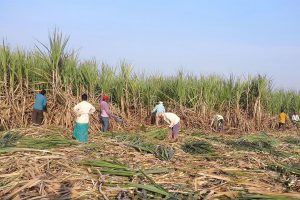THE GOVERNMENT must appoint the next set of officials at the Sugar Regulatory Administration (SRA) before the start of the next milling season in September to firm up possible plans to import the commodity, a legislator representing Bacolod said.
“By September this year, we start the new crop year and we need to appoint the new administrator,” Representative and former SRA board member Emilio Bernardino L. Yulo said in an interview.
“Our stock balance will be tight at the end of the crop year, which is August. We need a new sugar board to determine if there’s a need to import,” he added.
He also recommended that the next SRA chief be from Negros, as 50% of the land devoted to sugar farming is on the island.
“Sugar is a political commodity. It’s important we appeal to the ground level. We need to hear (the farmers) out. If you are there, you will be able to at least talk to them,” he added.
Mr. Yulo said that the next SRA board must also address rising input costs.
“The problem is the high input costs. (There are) high fertilizer costs; crude oil affects all aspects of production — it was P27 during the pandemic and now it’s P80-90. We (also) cannot blame our laborers if they ask for a corresponding wage (increase),” he said.
“It’s imperative for the sugar industry. If the drive of the administration is good food security, they need to bring down fertilizer prices. Since it’s a worldwide problem, we need to put up mechanisms for farmers to be compensated,” he added.
In July, the average price of refined sugar in wet markets rose to P87.50 per kilogram from P74.84 a month prior, according to the SRA.
“Our problem is the retail market. They were already supposedly included under Sugar Order (SO) No. 3, (but) it is more important for us to resolve the retail market, that’s where the majority of our consumers are. Again, we don’t want the sugar industry to be one of the culprits of high inflation,” Mr. Yulo said.
SO No. 3 authorizes the import of 200,000 MT of refined sugar to serve as a supply buffer.
Mr. Yulo added that the incoming imports from the order will not bring down retail prices, as these are earmarked for industrial users.
The United Sugar Producers Federation led by President Manuel R. Lamata sought a temporary restraining order on SO No. 3.
In February, the Sagay City and Himamaylan City Regional Trial Courts issued separate preliminary injunctions against SO No. 3.
Former SRA chief Hermenegildo R. Serafica issued a statement in June that SO No. 3 was issued after due consultation with millers, refiners, and cane planters.
“Sugar prices would not be this high if the sugar import program was not stalled. If not for the legal impediments caused by the group of Mr. Lamata, which caused delays in our import program, the imported sugar would have come in by May to June which (would have eased) the pressure on the supply and demand situation,” Mr. Serafica said.
“As early as February we projected a deficit in our sugar supply, largely because of weather disturbances such as Typhoon Odette (international name: Rai), excessive rain and overcast skies which have been detrimental to the growth and sugar content of the sugarcane in the majority of producing areas,” he added. — Luisa Maria Jacinta C. Jocson
